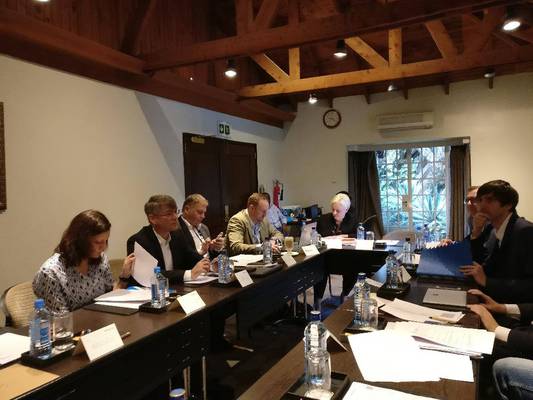Climate Change Worldwide
Development of a Global Climate Change Policy Strategy
Group work
Hanns-Seidel-Foundation therefore signed a global MoU with UNEP, but also is active in many countries in climate change policies, from school education, vocational training and university cooperation to practical projects in fields like water, renewable energies, afforestation etc.
Now, Hanns-Seidel-Foundation organized a conference in Nairobi, Kenya, to discuss various approaches to climate change policy, to learn from each other’s projects and to formulate a global climate change strategy. In South Korea, Hanns-Seidel-Foundation worked with Gangwon province and Goseong country for the promotion of renewable energy. In North Korea, Hanns-Seidel-Foundation from 2010 to 2014 was consulting for the successful introduction of Clean Development Mechanism projects. Since 2007, Hanns-Seidel-Foundation works on sustainable forestry and since 2015, we also work in nature protection, with a special focus on wetlands and migratory birds.
Plenary
After welcoming remarks by the representative of Hanns-Seidel-Foundation in Kenya, Uta Staschewski, and the head of the Institute of International Cooperation of Hanns-Seidel-Foundation, Dr. Susanne Luther, the conference started with a special lecture by Dr. Robert Kibugi of the University of Nairobi on “Climate Change and Migration”. Climate change exacerbates difficulties of pastoral life in East Africa (e.g. Kenya, Ethiopia, Tanzania) as well as West Africa (e.g. Niger and Nigeria), leading to often poverty, violent social conflict and migration, unsuitable agricultural practices. The pastoral lifestyle is undergoing generational change, but will for a long time be part of the economic life of African communities, making it also an obligation for the governments to protect the livelihood and human rights of these communities. Klaus Liepert, team leader Subsaharan Africa at the HSF headquarter and responsible for climate projects in HSF, afterwards moderated a discussion on the strategic aspects of current climate change projects of HSF worldwide.
In the afternoon, various groups worked on the development of a climate strategy on the basis of existing climate programs of HSF worldwide.
The second day started with extended discussions of elements of the climate strategy, focusing on political framework conditions, partners, internal structures etc. Prof. Ursula Männle, Chairwoman of Hanns-Seidel-Foundation, arrived to greet the attendants of the conference and stress the importance of the conference and its outcome.


